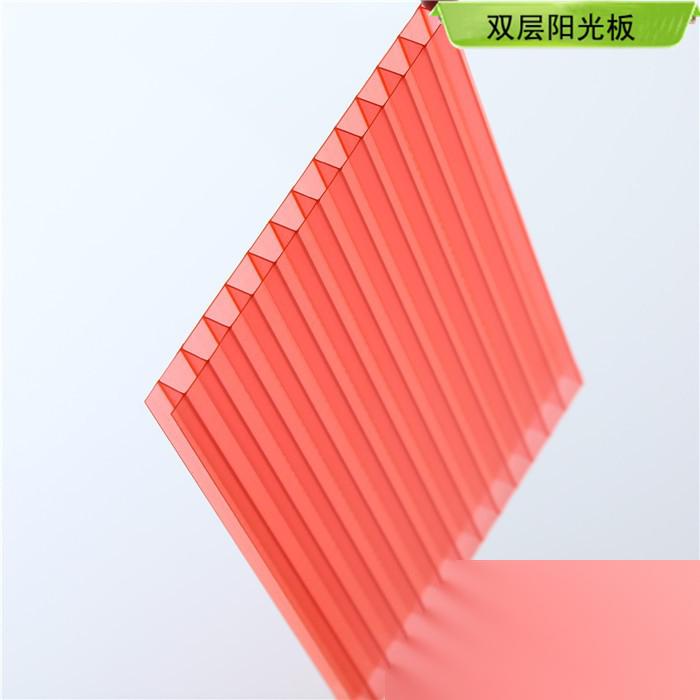Flame Retardancy
The self-ignition temperature of PCPolycarbonate Sheets is 630℃ (compared to 220℃ for wood). Tests conducted by the National Quality Supervision and Testing Center for Fire-Proof Building Materials show that the combustibility of PC sheets meets the GB (8624-1997) flame retardant B1 level, categorizing it as a flame-retardant engineering material.
Chemical Corrosion Resistance: PC polycarbonate sheets exhibit excellent chemical corrosion resistance, able to withstand various organic acids, inorganic acids, weak acids, vegetable oils, neutral salt solutions, aliphatic hydrocarbons, and alcohols at room temperature.
Thermal Resistance: PC polycarbonate sheets have good temperature differential resistance, allowing them to adapt to severe weather changes ranging from extreme cold to high temperatures, maintaining stable physical performance indicators within the temperature range of -40℃ to 120℃.
Photochemical Properties: PC polycarbonate sheets have high light transmittance within the visible light and near-infrared spectrum. Depending on the color, the light transmittance can reach 12%-88%.
UV Resistance and Anti-Aging: The surface of PC polycarbonate sheets contains a UV-resistant co-extruded layer, providing excellent outdoor weather resistance and maintaining good optical and mechanical properties over long-term use.
Impact Resistance: The impact strength of PC polycarbonate sheets is 80 times that of glass, and solid sheets are 200 times that of glass, preventing breakage during transportation, installation, and use. Another notable feature of polycarbonate sheets is that they do not shatter like commonly used glass, greatly enhancing safety and preventing harm to individuals.
Lightweight: PC polycarbonate sheets are lightweight, weighing only 1/12 to 1/15 of the same glass, ensuring safety against breakage, ease of handling, and installation, which can reduce the self-weight of buildings, simplify structural design, and save on installation costs.
The flexibility and plasticity of PC polycarbonate sheets make them ideal for installing domes and other curved surfaces, allowing for a bending radius that can reach 175 times the thickness of the sheet (bending radius 175 times thickness).
Evaluation: Combustibility
The self-ignition temperature of PC polycarbonate sheets is 630℃ (compared to 220℃ for wood). Tests conducted by the National Quality Supervision and Testing Center for Fire-Proof Building Materials show that the combustibility of PC sheets meets the GB (8624-1997) flame retardant B1 level, categorizing it as a flame-retardant engineering material.
Chemical Corrosion Resistance
PC polycarbonate sheets exhibit excellent chemical corrosion resistance, able to withstand various organic acids, inorganic acids, weak acids, vegetable oils, neutral salt solutions, aliphatic hydrocarbons, and alcohols at room temperature.
Thermal Resistance
PC polycarbonate sheets have good temperature differential resistance, allowing them to adapt to severe weather changes ranging from extreme cold to high temperatures, maintaining stable physical performance indicators within the temperature range of -40℃ to 120℃.
Photochemical Properties
PC polycarbonate sheets have high light transmittance within the visible light and near-infrared spectrum. Depending on the color, the light transmittance can reach 12%-88%.
UV Resistance and Anti-Aging
The surface of PC polycarbonate sheets contains a UV-resistant co-extruded layer, providing excellent outdoor weather resistance and maintaining good optical and mechanical properties over long-term use.
Impact Resistance
The impact strength of PC polycarbonate sheets is 80 times that of glass, and solid sheets are 200 times that of glass, preventing breakage during transportation, installation, and use. Additionally, the notable feature of polycarbonate sheets is that they do not shatter like commonly used glass, greatly enhancing safety and preventing harm to individuals.
Lightweight
PC polycarbonate sheets are lightweight, weighing only 1/12 to 1/15 of the same glass, ensuring safety against breakage, ease of handling, and installation, which can reduce the self-weight of buildings, simplify structural design, and save on installation costs.
The flexibility and plasticity of PC polycarbonate sheets make them ideal for installing domes and other curved surfaces, allowing for a bending radius that can reach 175 times the thickness of the sheet (bending radius 175 times thickness). For more information, please visit:
| http://www.cdpcban.com |













